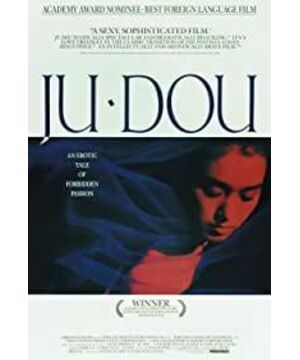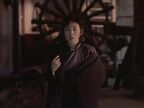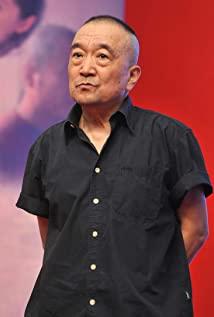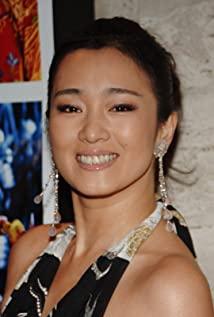Without talking too much theory, simply expand a few points from the plot itself:
1. Voyeurism, and Gender Narratives
Tianqing and Judou are from desire and end from love.
The "voyeur" in the first half is an important clue. The "seeing" driven by libido is itself erotic, and here it is related to Freud's voyeurism.
The mirror movement is very particular, from the perspective of Tianqing, peeping through the holes, and breathing. The audience has a strong sense of substitution, as if they are peeping.
In this process, Judou is the object to be looked at.
But is she just willing to be seen?
Judou made a female counterattack. During the second bath, Judou slowly turned around and faced the peepers. She opened her eyes.
Looking back is powerful.
"Then why didn't you block the second time!" Acknowledging to be watched and allowed to be watched - this is Judou's sexual invitation and sexual suggestion to Tianqing.
In being seen, the charm of women is recognized, and women become "women" (the latter refers to beings that have been otherized).
We say that there are only two kinds of women in the eyes of men: those who are dissolute and who need to be saved, and those who are goddesses, who are objects of worship.
The chrysanthemum beans in the eyes of Tian Qing obviously belong to the former.
2. Ethics, and Intergenerational Inheritance
"Judou" is of course a work about "ethics".
Incest, patricide,
The dislocation of ethical relations begins when natural human desires are suppressed by feudal ethics.
I think the most interesting irony of the whole film is this clip:
The older generation got together to name the new grandchildren, and the Tianzi generation had almost used up the names, and finally chose "white". Combined with Tianqing, "innocent".
China's traditional naming culture has unconsciously formed an irony - father and son are the same generation, but they are "clean and innocent" because of incest.
How could Tianbai kill someone? Or, how can a child watch his two "fathers" drown with indifference? How can you look at your biological mother with malicious eyes?
"He is still young and ignorant" "When Tianbai grows up, we will teach him slowly"
Newborn children must not understand ethics. Grandpa Jinshan's influence on Tianbai can show us how feudal thought in China is passed down from generation to generation.
Whether it is a small dye vat in a dye house or a large dye vat in an ancient feudal country, who is really being dyed?
is the child.
So Mr. Lu Xun wanted to call "Save the child".
Not to mention Oedipus, the original work "Fuxi Fuxi" is to sinicize this psychoanalytic element from the west.
"Judou" can certainly be called the Chinese Oedipus myth.
3. How to die
How do we die, in water or in fire?
Ophelia died in water, and many women wounded by love died in water; male revolutionaries mostly chose to die in fire. (Here you can refer to the death of Jaromil in Milan Kundera's writings)
Therefore, Yang Jinshan and Yang Tianqing both died in the water, and Judou died in the fire, which has a deep metaphor:
The men in the family are feudal and cowardly, but Judou is a woman who bravely breaks through barriers and pursues her own love.
finally
This film made me feel like listening to Debussy's "Moonlight" in broad daylight.
Psychedelics are real, and bleakness is real.
View more about Ju Dou reviews










